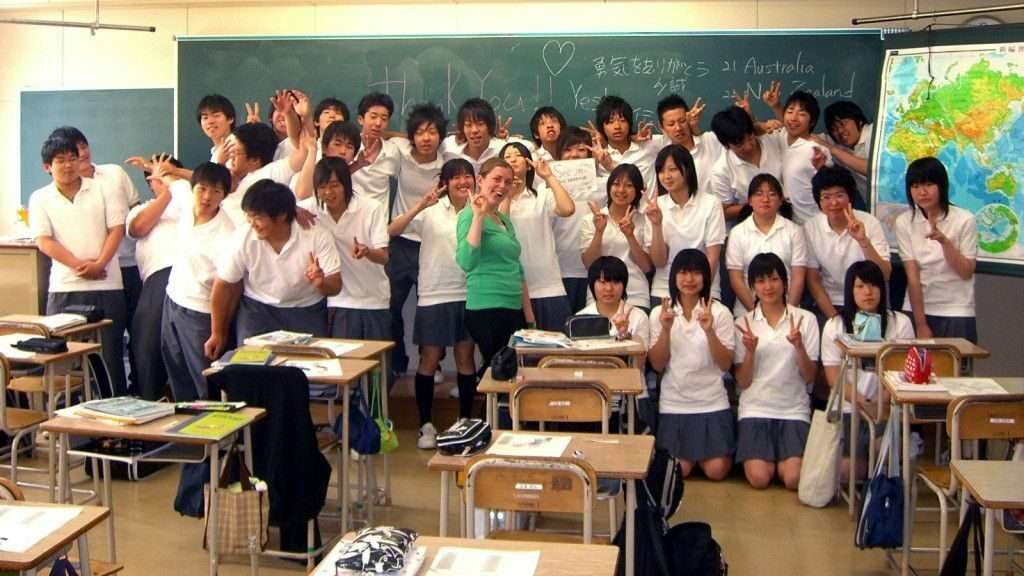Types Of Teaching Jobs Available To Teach English In Japan
Once you have decided that you would like to explore teaching jobs abroad in Asia, the first place on most peoples list is to teach English in Japan which is no surprise as it is a top contender for best countries to teach English, it is time to research and identify the teaching opportunities in the country. So how do you go about getting a job in this highly coveted market for English teachers? There are four options that you can explore for teaching in Japan:
The JET Program:
The JET program’s two positions are Assistant Language Teacher (ALT) and Coordinator for International Relations (CIR). As an ALT, you will be placed either in a public school or the local board of education. The job involves assisting in the English class, preparing course material and organising extracurricular activities. Around 10 per cent of JET participants are taken on board as CIRs.
The job profile includes teaching English to government officials or residents, translating material, producing pamphlets or brochures in English. Functional knowledge of Japanese is required to get a CIR posting. This is one of the easiest ways to secure a way to teach English in Japan.
Private language schools:
There are language schools, known as eikaiwa, across Japan. You can choose to work either in Tokyo or other cities like Kyoto, Yokohama, Osaka, and Fukuoka. There are language schools in smaller towns too. If one of your motives to teach English in Japan is to delve deeper into Japanese culture and way of life, apply to these schools. They are an excellent way to connect to the people and the land.
Online platforms:
If you are keen on a job with flexible work hours – so that you have more time on hand to indulge in your love for exploring Japan – check out the exploding market of online platforms. Students registered on these platforms are given lessons to enhance their English conversational skills.
All you need is access to an internet connection and a Skype or similar voice/video app. Though the job gives you flexibility, the courses are very structured and involve preparing lesson materials and planning each class schedule as per guidelines.
International/Bilingual schools/preschools/colleges:
There are international schools and also preschools and kindergarten schools which cater to the expatriate population. In many of these schools, English is the primary language of instruction. English is taught even in schools where French or German is the medium of instruction.
Teaching in preschool or kindergarten schools will require unique energy and the ability to handle little kids. Even if you have a TEFL certification, check out these options only if you have the inclination and talent to teach the little ones. Most colleges and universities have foreign language departments, including English. You would need a master’s degree and work experience to apply here.

Which of these would be the best option? International schools are the best in terms of facilities and salaries offered to teachers. The Japan Exchange Teaching (JET) program has slightly higher salaries than the average language school. However, working for JET may not give you the option to choose your work location. You may be posted in a rural school, and if you are not keen about the move, there is very little that you can do about it.
If you are exploring openings in private language schools, you have the advantage of focussing your search on locations you are more comfortable with. You could make up the difference in salary levels between a JET posting and a private language school job by taking private tuitions. This is allowed as long as you have a valid work visa.
Educating Abroad Quick Tip: Most of the big language schools are in bigger cities. Concentrate your job search in these areas.
Do you have the Qualifications To Teach English in Japan?
If you apply for a post under the JET program, the minimum qualification to teach English in Japan is a Bachelor’s degree. You must also be a national and not just a permanent resident of the country from where you are recruited. For example, you need to be a Canadian national to apply under the Canadian quota for the JET program. You will not be eligible if you are a resident of Canada, but hold some other country’s citizenship.
A bachelor’s degree is mandatory, even if you are exploring options outside the JET program. You must be a native English speaker or should have completed 12 years of schooling in English. TEFL certification is required to apply in private language schools. The much sought after jobs in the international schools would need a few years of work experience.
When Is The Best Time To Start Your Job Search To Teach English In Japan?
When should you start applying for a teaching job in Japan? The Japanese foreign affairs ministry conducted the JET recruitment process via its embassies and consulates across the world.
The application forms are released at different times in different countries, but it is usually done during the last quarter of the year. Visit the Japanese embassies or consulates in your city in October to get more information on when the application process will begin for the coming academic year. Teaching positions are available in private language schools and online platforms throughout the year.
The application and visa processes are time-consuming. Therefore, it makes sense to have a job in hand before you land in Japan. The other option is to go to Japan on a tourist visa and then seek placement. However, there is no guarantee that you will land a job, and the expenses could pile up.
Once you are selected for a teaching post, the school will offer you a contract. Ensure that all the terms negotiated have been included in it. Generally, school contracts include information on salary, working hours, holidays and transportation. Any other benefit that has been promised, for example, housing, medical insurance or flight tickets to go back home at the end of your stint, must also be included in the contract.
How to ensure that your Visa Process is Smoothly Executed
Once you have got your job, it is time for the visa documentation. There are several categories of work visas in Japan. You need to select the right one, depending on the kind of school or college which has recruited you. The three categories of work visa that normally apply for a teaching job are:
1. Professor:
This work visa category is applicable if you have secured a position at a Japanese university or college as a university professor or assistant professor.
2. Instructor:
You have to apply for a work visa as an instructor if selected for the JET program. It allows you to work as an ALT in elementary, intermediate and high schools.
4. Specialist in humanities:
You will have to apply for a work visa under this category if you have landed a job in a private language school or a corporate.
n.b. Work visas are valid for a maximum period of five years. But depending on your contract, you may be issued a 3-year, 1-year or three-month visa too.
Educating Abroad Quick Tip: A six month Working Holiday visa is available for citizens of Australia, New Zealand, Canada, Korea, France, Germany, the United Kingdom, Ireland, Denmark, Hong Kong and Norway. As the name suggests, this is the ideal visa to apply for once you are serious about exploring Japan and want to work only part-time.
What are the Essential Documents for your Visa To Teach English In Japan?
The documentation required for all three categories of work visas is more or less the same.
Documents you need to provide:
- Passport
- One visa application form
- One photograph
- Certificate of Eligibility (CoE)
The Certificate of Eligibility is a document that the Immigration Bureau issues, Ministry of Justice in Japan. It certifies that your application and credentials conform to the conditions for landing in Japan.
Typically, the school that employs you will apply for the CoE with local immigration authorities. You could apply for a visa without a CoE. But the process becomes extremely cumbersome as you would need to submit several more verified and authenticated documents than listed above.
The additional paperwork would include documents certifying your degree or teaching license and records to validate your claims regarding your professional history. You would need to submit verification letters from your previous employers as well as a copy of your CV. Your contract with your Japanese employer would also have to be submitted.
Educating Abroad Quick Tip: Applying for a visa without a CoE is a time consuming, bureaucratic process. With a CoE, your visa will be processed between four days to two weeks. Without a CoE, it could be several months before your work visa is issued.
So let us recap the steps to be taken once you are hired as a teacher in Japan:
- Submit to your new employer all the relevant documents needed to apply for a CoE from the immigration department. This would include a copy of your passport, passport-sized photographs, a resume, a copy of your degree, graduation certificate, and teaching license.
- Once the CoE comes through, go to the Japanese Embassy or consulate and apply for a work visa.
- You can depart for Japan after your work visa is issued. Your residence card will be given to you when you land there.
Working In A Japanese School
Working in a Japanese school can be professionally rewarding and fulfilling. ALT teachers under the JET program typically have a five-day week, and teaching hours would be around 30 hours a week.
There is normally only one foreign teacher per school, and there are 30-40 students per class. ALT teachers have administrative and extracurricular duties too. As an ALT teacher, you are eligible for four weeks off in August and two weeks in December (paid), all national holidays, and personal days off.

Working in private language schools is a different experience and depends a lot on your contract and the kind of institute where you are working. You could have a five day or six-day week. Working hours can be flexible if you have opted for a part-time arrangement. Full-time teachers usually work 25-26 hours a week and are eligible for 10 personal days off and national holidays.
The class sizes vary depending on the demand for English speaking skills in the area where you are teaching. Payment is normally based on the number of hours that you work. It would be best if you were prepared to work on Saturdays. You may also have evening and night classes on your schedule.
If these conditions seem a bit daunting, here is the good news. English language teachers’ feedback is that teaching in private language schools is a fun experience as the students are more responsive, and the classes are extremely interactive. This is because most of the students (which often include older adults) have signed up for the classes because of their keenness to learn the language. As teachers, we know eager students make teaching that much more enjoyable!
Some Quick FAQ's On Teaching English In Japan
How to teach English in Japan?
If you are wondering how to to teach English In Japan, then the easiest way to teach English in Japan is to join the JET program as there is a lot of information online. You could also teach English in Japan by working at an International school, an Eikiwa which is Japans name for Language schools / centres.
What do you need to teach English in Japan?
The qualifications you need to teach English in Japan is Bachelors degree, and to secure the best english teaching jobs in Japan with the best schools and employers is a Masters Degree
How hard is it to teach English in Japan?
Japan is a very popular destination for English teachers which makes it hard to teach English In Japan. You would need a high level of academic qualifications. However there is always opportunities due to the need for English teachers in Japan.
How long can you teach English in Japan?
You can teach English in Japan for a long time as contracts are usually renewable. Contracts of employment are flexible and have a range between 6 months to 2 years.
Salaries For Teachers In Japan
According to the JET Programme website, recruited teachers are paid approximately 3.36 million yen in their first year of appointment, about 3.6 million yen in their second year of work, approximately 3.9 million yen for their third appointment, and those appointed for a fourth and fifth year, approximately 3.96 million yen for each year.
You would have to pay income and resident tax. In dollar terms, your salary would be around $2500 per month.
Salaries in private language school would be in the same range for full-time English teaching positions. Part-time teachers earn around ¥125,000 ($1200) per month.
Educating Abroad Quick Tip: Contracts normally include reimbursement of airfare to Japan.
Cost of Living: What Kind of Lifestyle can you afford in Japan?
Cost of living is high in Japan, with rents and entertainment expenses being higher in the premier cities like Tokyo. Your day-to-day living expenses – housing, groceries and transportation – will account for nearly 70 per cent of your salary. The rental for a single flat in the centre will be around $750. A similar apartment outside the city centre can be rented for about $500. You will have to spend an additional $150 for monthly utilities like electricity, heating, cooling and garbage disposal.
Educating Abroad Quick Tip: Read the house rental contract you sign with your landlord carefully as there will be additional charges like management fees (kanrihi) and gift money (rei-kin). You would also need to pay some months of rent upfront.
Japan is a great place for eating out. There are restaurants to cater to every price range and taste. The bill for a quick bite at an inexpensive restaurant will be around $8-10. Perhaps, you can get a better sense of the costs when comparing lunch at McDonald’s! A McMeal in a Japanese city will cost you around $6. A three-course meal at a midscale restaurant will set you back by about $40.
Health care is expensive in Japan, and it is necessary to have medical insurance. Most employers do include medical insurance as part of the pay package. If not, it will be wiser for you to negotiate for its inclusion.
Life in Japan: the Land of the Rising Sun
Japan is an exciting and beautiful destination. You may feel a sense of alienation initially given the vast cultural differences and the language barrier. But once you settle in and immerse yourself in the Japanese way of life, you will appreciate the uniqueness of this land and its people.
After your workday, several other activities can keep you busy. Cities like Tokyo are buzzing, happening places. You could spend your off time enjoying Japanese cuisine, learning more about Japanese cinema, imbibing the zen mindfulness philosophy and trying to fine-tune your anime skills.
There are plenty of outdoor adventure options in the hiking trails, ski slopes, bicycle tours, and what must be considered one of Japan’s well-kept secrets – the surfing spots.
Educating Abroad Quick Tip: It is a good idea to pick up some rudimentary Japanese before moving to the country. It will make the settling down process that much easier and quicker. It will also help to build a great connection with your students and the Japanese in general.
Travelling in Japan is extremely easy, with its highly sophisticated and efficient transport system. The bullet trains (shinkansen) run across the length of the country. The subway system is extensive and well organised. With reasonably priced tickets, you can explore the country, using just the public transport system.
Some Exclusive Japanese Experiences
Some experiences are exclusive to Japan. These should be included in your must-do list for Japan.
A night out in a Ryokan:
Ryokan is a traditional Japanese inn. Typically low slung, wooden buildings, they take pride in preserving the old Japanese lifestyle and attitudes. You would have to sleep on futons on tatami floors. Besides, there is the pleasure of being served traditional Japanese meals in the Japanese style with seasonal ingredients.

Celebrating Life with the Cherry Blossoms:
There is a magical spell in spring when Japan is a pink sea with countless cherry blossom trees in riotous bloom. The Japanese celebrate this annual event as an affirmation and renewal of life. Join the Japanese as they gather in the parks and on river banks for traditional cherry blossom viewing parties known as Hanami.

The Majestic Spectacle of Sumo:
The Japanese adore this sport which traces its lineage to ancient times when it was held to entertain and appease the Shinto deities. With several religious connotations even today, watching a Sumo match can be a somewhat spiritual experience. Once you have taken in the mysticism of the salt purification ceremony, be prepared for the sheer excitement that ripples through the crowd as two gigantic wrestlers pit themselves against each other in a powerplay of wits and strength.

The Matsuri Magic:
Summertime is Masturi time in Japan. Matsuri is local festivals that have their roots in the country’s Shinto and Buddhist traditions. Like all festivals, there is a lot of singing, dancing, drinking, eating and celebrating. Colourful and vibrant, the matsuri evolved as a way to renew community bonds. Join in the Matsuri celebrations to get close and connected with Japan, its people and way of life.

Educating Abroad Quick Tip: Do visit a Japanese castle. They are picturesque and magnificent. You will feel as though you have stepped right into the middle of a fairy tale.
Shared teaching English in Japan experiences found on YouTube
Japan As A Place To Teach English: Our Final Thoughts
A well-paid job and a comfortable lifestyle in one of the most modern and technologically advanced nations of the world make Japan a popular destination for teaching abroad. There is a minimal downside to teaching in Japan. But it is wise to prepare yourself mentally for a period of adjustment. The cultural changes and language issues may seem insurmountable initially.
However, once the bond with your students and neighbours are established, you will love this wonderful country with its fascinating mix of modern, western buzz and ancient, eastern ethos. Long after you leave the shores of Japan, post your teaching assignment, the memories of the perpetual buzz and hum of life in busy Tokyo, the towering mystique of Mount Fuji, the aching beauty of the cherry blossoms and the tranquil air of the ancient shrines will keep reminding you of this wonderful country.




















